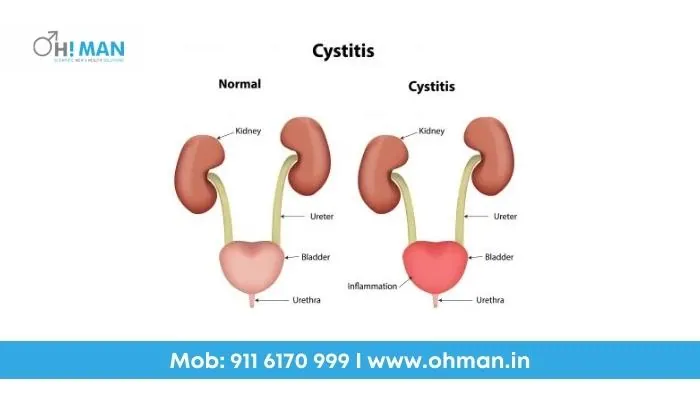Cystitis : Symptoms, Causes, Treatment and Prevention
Cystitis : Symptoms, Causes, Treatment and Prevention

Cystitis is a condition that occurs when bacteria that usually remain harmlessly on the skin or within the bowel enter the bladder and urethra. The bacteria adhere to the bladder’s lining and causes the bladder to become inflamed and irritated, known as a bladder infection.
While cystitis isn’t typically a significant condition, however, the condition can cause discomfort and lead to complications if not treated.
What Is Cystitis?
Cystitis is a condition that causes inflammation of the bladder’s wall and it is treatable. However, if a patient frequently experiences or symptoms of kidney disease, They should seek medical advice.
Cystitis can be a problem for anyone, regardless of sex or age. However, it’s more prevalent for females. So, the reason can be due to females having a smaller urinary tract located nearer to the bladder, which means bacteria could get into the bladder faster.
Cystitis could be interstitial or acute.
Acute cystitis is a type of cystitis that develops abruptly. Interstitial cystitis is a longer-term condition and is also referred to as chronic cystitis. Moreover, the reason for interstitial cystitis is still unknown. However, researchers are working on understanding it.
There are many types of cystitis, and the different kinds are identified by their causes. They include:
- Bacterial Cystitis: The cause is when those bacteria infiltrate the bladder via the urethra and cause irritation to the bladder’s walls.
- Drug-induced Cystitis: Some medicines can irritate the bladder when they leave the body. Also, certain chemotherapy medications could cause an individual to develop cystitis.
- Cystitis caused by radiation: Therapy with radiation can reduce tumours and kill cancerous cells. However, it may cause damage to healthy cells. Also, radiation cystitis usually results from treatment that targets your pelvis.
- External body cystitis (FBC) occurs when a patient is treated using a stent, catheter, or other instruments for endoscopy. Bacteria may invade the urethra via the insertion and removal of the stent or catheter or through damage from placement or removal of the catheter can result in inflammation.
- Chemical cystitis: This can be described as bladder-related inflammation which results from various treatments, including chemotherapeutic agents. It may also develop due to gels, soaps, spermicides, and dyes.
Cystitis Causes
Usually, bacteria like E. coli are to blame, and they are typically found within the skin and inside your intestinal tract and aren’t an issue. However, if they enter the urethra, the tube responsible for carrying urine from your body, bacteria could end up in your bladder, causing issues.
It’s not as prevalent. However, you could contract due to:
- Chemicals found in personal care products like bubble baths, soaps and the spermicides
- Chemotherapy drugs
- The damage from bladder surgery can be caused by using a catheter, a tube used to help empty the bladder of urine.
- Radiotherapy to cure cancer within your pelvic region
Certain people suffer from a condition known as interstitial cystitis, a condition in which the bladder gets swollen constantly, but there’s no sign of an infection. Moreover, doctors aren’t sure what triggers the condition, and it’s more challenging to treat than normal cystitis.
Further, male cystitis is possible when protected during anal sex and may have a greater risk of contracting.
Cystitis is also prevalent amongst postmenopausal women. In menopause, the estrogen levels decrease, and the urethra’s lining becomes thinner. The thinner the lining gets, the more likely you will be of damage and infection.
The following factors also increase your chance of getting cystitis:
- A tube, known as a urinary catheter inserted into the bladder.
- Diabetes
- A larger prostate, a narrowed urethra or anything that restricts the urinary flow
- Incontinence ( bowel incontinence)
- Ageing in the older years (most typically in those who reside in nursing care homes)
- Pregnancy
- The urethra (the tube that connects the bladder and the urethra) is blocked.
- Techniques involving the urinary tract
- Problems with entirely discharging your bladder (urinary retention).
- Sitting in a solitary position (immobile) for a prolonged duration of time (for instance, when you’re recovering from a hip injury)
Cystitis Symptoms
So, its signs and symptoms could differ depending on the type of cystitis an individual suffers.
Acute cystitis
In cases of cystitis that is acute symptoms can be:
- burning, pain or stinging after urinating
- More frequent urination
- Dark and cloudy urine
- Urine with strong-smelling
- Urgent need to eliminate urine
- pain that is felt in the lower abdomen
- general aches, weakness and fatigue
Both males and females exhibit similar symptoms.
Children, for example, may experience symptoms that could include:
- The fever
- fatigue, weakness and aches
- irritability
- Lack of appetite
- nausea and vomiting
Acute cystitis and hematuria
This is where people develop it in the presence of blood present in urine.
The patient will suffer from similar symptoms to acute cystitis. Also, the blood could or might not be seen in urine, and in some instances, the blood may be only visible when examined under the microscope.
Hemorrhagic cystitis
This is because the blood vessels within the bladder’s lining are also damaged.
Signs include urine accompanied by blood as well as:
- discomfort when you urinate
- burning or stinging after passing urine
- More frequent urination
- Feeling an intense urgency for urinating
- Loss of bladder control
Hemorrhagic cystitis can develop consequently to radiation treatment. If timely treatment isn’t availed, the condition would advance through stages.:
- Class I: It is a case of microscopic blood loss.
- Class II: It is apparent.
- Level III: The haemorrhage is accompanied by small blood clots.
- Class IV: The patient is experiencing bleeding and large blood clots, which could hinder urine flow.
Interstitial cystitis
Interstitial cystitis may cause:
- discomfort in the lower abdomen vaginal, urethral, or lower abdominal region
- frequent urge for urination
- The urgent urge for urination
Interstitial cystitis in men can also experience discomfort in their testicles, the scrotum, the perineum, and pain when they ejaculate.
Interstitial cystitis sufferers may be suffering from acute or chronic pain.
The term “acute pain” refers to sudden pain for a brief period, while chronic pain is a condition that can recur regularly or last for longer both.
Cystitis Vs. UTI
Cystitis is one of the types of UTI. UTIs are infections that affect the urinary tract, which means they may comprise everything from the urethra to the kidneys and even the bladder. A bladder infection is known as cystitis. Bacterial can be a form of UTI. However, other types of cystitis might not be.
The lower tract UTIs influence the urethra and the bladder, while higher tract UTIs affect the kidneys. Further, an upper tract UTI could be life-risky in case bacteria outspread from the affected kidney to the blood.
The symptoms of lower tract UTI are symptoms of cystitis bacterial.
Additionally, upper tract symptoms of UTI could also include:
- discomfort in the upper back
- febrile
- nausea
- vomiting
- chills
Treatment & Diagnosis
The diagnostic procedure involves:
The doctor will first take a physical examination and consider your complaints. So, you could then receive:
- Urine analysis to determine if there is the presence of bacteria, blood, or pus in your urine
- Urine cultures to determine which type of bacteria you are suffering from.
The reason is often a urinary tract infection, and that’s the only test you’ll require. Moreover, if you’re a member of one of the groups mentioned below, you need more advanced tests to identify the reason for cystitis.
- Children
- Men (Since they don’t tend to develop, It could indicate something different.)
- People with damage to the kidneys
- Women who suffer from 3 or more urinary tract infections in a year
Your doctor may use:
- Cystoscopy. The doctor will insert the cystoscope, a small tube equipped with cameras — into the urethra of your body to check for issues or obtain an organ sample for further tests ( biopsy).
- Imaging. Imaging. Ultrasound, CT scan and an MRI may reveal the presence of tumours and kidney stones and other health issues.
- Intravenous Urogram (IVU). An X-ray procedure utilizes contrast dye to capture pictures of the kidneys, bladder, and ureters.
- Voiding cystourethrography. The doctor will inject dye into your bladder to determine whether any urine flows backwards from the bladder to the kidneys.
- Retrograde Urethrography. This test makes use of contrast dye to detect problems with the urethra.
Treatment Of Cystitis
The majority of people suffering from mild cystitis be resolved within a couple of days. If the condition continues for three days or longer, the patient should talk to a doctor.
A doctor can prescribe antibiotics, and the form and length of the treatment will vary according to the patient. For instance, a doctor could prescribe:
- Nitrofurantoin One can consume 100 milligrams (mg) every day for 5-7 days.
- Sulfamethoxazole-trimethoprim
- Fosfomycin: This includes only a single dose of mg.
If the symptoms don’t ease after the use of antibiotics, the patient should go back to a doctor.
You can try some things to alleviate cystitis-related symptoms regardless of what’s causing it:
- Utilize the heating pads and hot water bottles. Apply them to your belly to relieve discomfort in the bladder.
- Take sitz baths. Make sure you put just enough water into the tub to reach your hips.
- Take plenty of water. It is essential to drink plenty of water. Drink enough water and avoid alcohol, coffee, and other caffeine drinks. Beware of spicy foods as they can cause an outbreak of cystitis for some people.
- Wear loose-fitting cotton underwear and cotton clothing. Cotton won’t hold onto sweat when you sweat, which could help reduce the development of bacteria. In addition, looser clothing doesn’t place pressure on your belly.
Prevention Of Cystitis
There’s no method to prevent cystitis; however, some doctors suggest you:
- Avoid soaps, bubble baths and powders with fragrances in them. Also, don’t apply sprays or deodorants to your vagina.
- Avoid retaining the urine for too long. Go pee when you get the desire.
- Take plenty of fluids.
- Urinate after having sex.
- Make sure you clean your bottom from front to back following the use of bathroom.
Bottom Line
If a person suffers from mild to moderate symptoms, it could be managed with prescription painkillers and natural treatments.
If it doesn’t disappear by itself, the issue may require medical attention. Further, doctors can also write preventive prescriptions for antibiotics for those suffering from frequent episodes of cystitis.
The more complicated forms of cystitis need different treatments and can trigger a range of problems without treatment. Additionally, patients must consult with their doctor if they suspect that they are suffering from cystitis for the first time.
At Ohman, we have experienced doctors who can treat any men’s sexual wellness and Sexual disorders. Moreover, to get the best medications to treat your underlying condition, you can book an online consultation with the specialists of Ohman. You can get medications relating to erectile dysfunction, premature ejaculation, and other medical concerns. You can get medications online through Ohman.



